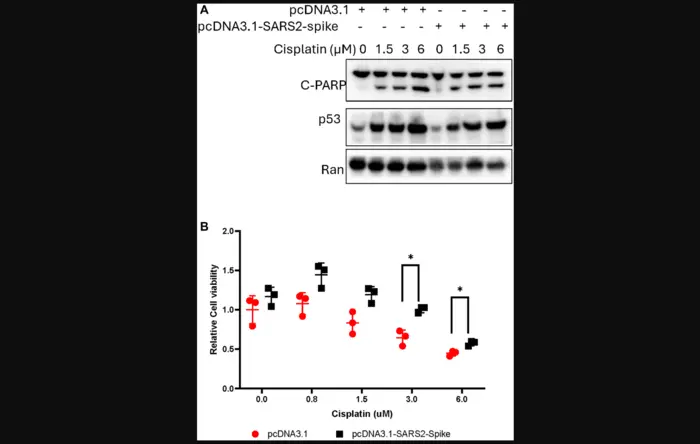“Our findings have implications for the natural history of prolonged or repeated SARS-CoV-2 infection as well as design of anti-COVID-19 vaccines that are administered repeatedly as booster shots.”

Credit: 2024 Zhang and El-Deiry.
“Our findings have implications for the natural history of prolonged or repeated SARS-CoV-2 infection as well as design of anti-COVID-19 vaccines that are administered repeatedly as booster shots.”
BUFFALO, NY- May 6, 2024 – A new research paper was published in Oncotarget’s Volume 15 on May 3, 2024, entitled, “Transfected SARS-CoV-2 spike DNA for mammalian cell expression inhibits p53 activation of p21(WAF1), TRAIL Death Receptor DR5 and MDM2 proteins in cancer cells and increases cancer cell viability after chemotherapy exposure.”
Severe acute respiratory syndrome coronavirus 2 (SARS-CoV-2) and COVID-19 infection has led to worsened outcomes for patients with cancer. SARS-CoV-2 spike protein mediates host cell infection and cell-cell fusion that causes stabilization of tumor suppressor p53 protein. In-silico analysis previously suggested that SARS-CoV-2 spike interacts with p53 directly but this putative interaction has not been demonstrated in cells. In this new study, researchers Shengliang Zhang and Wafik S. El-Deiry from Brown University and Lifespan Health System examined the interaction between SARS-CoV-2 spike, p53 and MDM2 (E3 ligase, which mediates p53 degradation) in cancer cells using an immunoprecipitation assay.
“We observed that SARS-CoV-2 spike protein interrupts p53-MDM2 protein interaction but did not detect SARS-CoV-2 spike bound with p53 protein in the cancer cells.”
The researchers further observed that SARS-CoV-2 spike suppresses p53 transcriptional activity in cancer cells including after nutlin exposure of wild-type p53-, spike-expressing tumor cells and inhibits chemotherapy-induced p53 gene activation of p21(WAF1), TRAIL Death Receptor DR5 and MDM2. The suppressive effect of SARS-CoV-2 spike on p53-dependent gene activation provides a potential molecular mechanism by which SARS-CoV-2 infection may impact tumorigenesis, tumor progression and chemotherapy sensitivity. In fact, cisplatin-treated tumor cells expressing spike were found to have increased cell viability as compared to control cells.
Further observations on γ-H2AX expression in spike-expressing cells treated with cisplatin may indicate altered DNA damage sensing in the DNA damage response pathway. The preliminary observations reported here warrant further studies to unravel the impact of SARS-CoV-2 and its various encoded proteins including spike on pathways of tumorigenesis and response to cancer therapeutics. More efforts should be directed at studying the effects of the SARS-CoV-2 spike and other viral proteins on host DNA damage sensing, response and repair mechanisms.
“A goal would be to understand the structural basis for maximal anti-viral immunity while minimizing suppression of host defenses including the p53 DNA damage response and tumor suppression pathway. Such directions are relevant and important including not only in the context of viral infection and mRNA vaccines in general but also for patients with cancer who may be receiving cytotoxic or other cancer treatments.”
Continue reading: DOI: https://doi.org/10.18632/oncotarget.28582
Correspondence to: Wafik S. El-Deiry
Email: wafik@brown.edu
Keywords: SARS-COV2 spike, p53, MDM2, chemotherapy, cancer
Click here to sign up for free Altmetric alerts about this article.
About Oncotarget: Oncotarget (a primarily oncology-focused, peer-reviewed, open access journal) aims to maximize research impact through insightful peer-review; eliminate borders between specialties by linking different fields of oncology, cancer research and biomedical sciences; and foster application of basic and clinical science.
Oncotarget is indexed and archived by PubMed/Medline, PubMed Central, Scopus, EMBASE, META (Chan Zuckerberg Initiative) (2018-2022), and Dimensions (Digital Science).
To learn more about Oncotarget, visit Oncotarget.com and connect with us on social media:
- X, formerly Twitter
- YouTube
- Spotify, and available wherever you listen to podcasts
Click here to subscribe to Oncotarget publication updates.
For media inquiries, please contact media@impactjournals.com.
Oncotarget Journal Office
6666 East Quaker Street., Suite 1A
Orchard Park, NY 14127
Phone: 1-800-922-0957 (option 2)
###
Journal
Oncotarget
Method of Research
Experimental study
Subject of Research
People
Article Title
Transfected SARS-CoV-2 spike DNA for mammalian cell expression inhibits p53 activation of p21(WAF1), TRAIL Death Receptor DR5 and MDM2 proteins in cancer cells and increases cancer cell viability after chemotherapy exposure
Article Publication Date
3-May-2024



